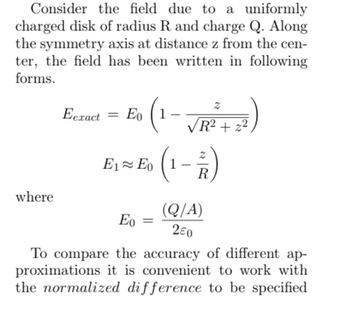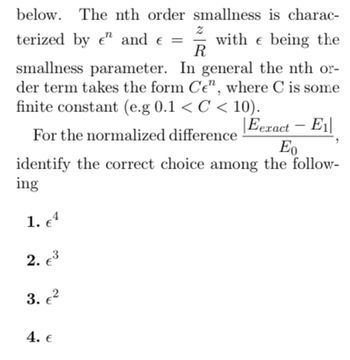Question
Choice 4 not corret

Transcribed Image Text:Consider the field due to a uniformly
charged disk of radius R and charge Q. Along
the symmetry axis at distance z from the cen-
ter, the field has been written in following
forms.
where
。 (1-√√R² +2²³)
Eeract = Eo
E₁ ≈ E (1-2)
R
(Q/A)
280
Eo =
To compare the accuracy of different ap-
proximations it is convenient to work with
the normalized difference to be specified

Transcribed Image Text:below. The nth order smallness is charac-
2
terized by e" and € =
with being the
e
R
smallness parameter. In general the nth or-
der term takes the form Ce", where C is some
finite constant (e.g 0.1 < C < 10).
For the normalized difference
Eexact - E₁
Eo
identify the correct choice among the follow-
ing
1. e4
2. €³
3. €²
4. €
Expert Solution
arrow_forward
Step 1: Concept
I have used concept of binomial theorem
Step by stepSolved in 3 steps with 1 images

Knowledge Booster
Similar questions
- Can you please solve this question and all of the sub questions and show all of the stepsarrow_forwardPlease answer question and just send me the paper solutions asap dont type the answer question 3ab asap pleasearrow_forwardPlease answer question and just send me the paper solutions asap dont type the answer question 2 abc ASAParrow_forward
arrow_back_ios
arrow_forward_ios